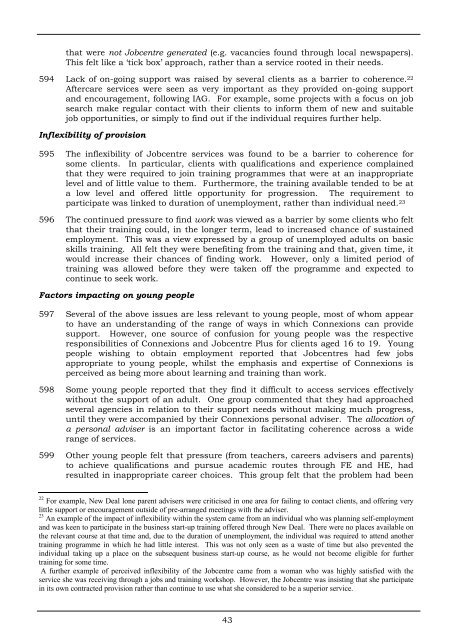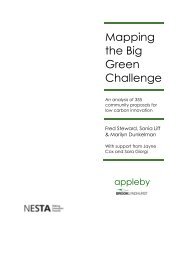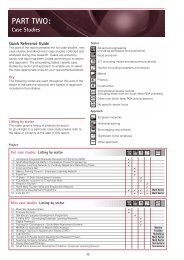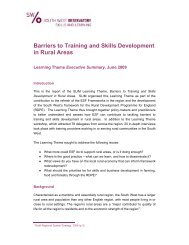Client needs for coherent information, advice and guidance services ...
Client needs for coherent information, advice and guidance services ...
Client needs for coherent information, advice and guidance services ...
You also want an ePaper? Increase the reach of your titles
YUMPU automatically turns print PDFs into web optimized ePapers that Google loves.
that were not Jobcentre generated (e.g. vacancies found through local newspapers).<br />
This felt like a ‘tick box’ approach, rather than a service rooted in their <strong>needs</strong>.<br />
594 Lack of on-going support was raised by several clients as a barrier to coherence. 22<br />
Aftercare <strong>services</strong> were seen as very important as they provided on-going support<br />
<strong>and</strong> encouragement, following IAG. For example, some projects with a focus on job<br />
search make regular contact with their clients to in<strong>for</strong>m them of new <strong>and</strong> suitable<br />
job opportunities, or simply to find out if the individual requires further help.<br />
Inflexibility of provision<br />
595 The inflexibility of Jobcentre <strong>services</strong> was found to be a barrier to coherence <strong>for</strong><br />
some clients. In particular, clients with qualifications <strong>and</strong> experience complained<br />
that they were required to join training programmes that were at an inappropriate<br />
level <strong>and</strong> of little value to them. Furthermore, the training available tended to be at<br />
a low level <strong>and</strong> offered little opportunity <strong>for</strong> progression. The requirement to<br />
participate was linked to duration of unemployment, rather than individual need. 23<br />
596 The continued pressure to find work was viewed as a barrier by some clients who felt<br />
that their training could, in the longer term, lead to increased chance of sustained<br />
employment. This was a view expressed by a group of unemployed adults on basic<br />
skills training. All felt they were benefiting from the training <strong>and</strong> that, given time, it<br />
would increase their chances of finding work. However, only a limited period of<br />
training was allowed be<strong>for</strong>e they were taken off the programme <strong>and</strong> expected to<br />
continue to seek work.<br />
Factors impacting on young people<br />
597 Several of the above issues are less relevant to young people, most of whom appear<br />
to have an underst<strong>and</strong>ing of the range of ways in which Connexions can provide<br />
support. However, one source of confusion <strong>for</strong> young people was the respective<br />
responsibilities of Connexions <strong>and</strong> Jobcentre Plus <strong>for</strong> clients aged 16 to 19. Young<br />
people wishing to obtain employment reported that Jobcentres had few jobs<br />
appropriate to young people, whilst the emphasis <strong>and</strong> expertise of Connexions is<br />
perceived as being more about learning <strong>and</strong> training than work.<br />
598 Some young people reported that they find it difficult to access <strong>services</strong> effectively<br />
without the support of an adult. One group commented that they had approached<br />
several agencies in relation to their support <strong>needs</strong> without making much progress,<br />
until they were accompanied by their Connexions personal adviser. The allocation of<br />
a personal adviser is an important factor in facilitating coherence across a wide<br />
range of <strong>services</strong>.<br />
599 Other young people felt that pressure (from teachers, careers advisers <strong>and</strong> parents)<br />
to achieve qualifications <strong>and</strong> pursue academic routes through FE <strong>and</strong> HE, had<br />
resulted in inappropriate career choices. This group felt that the problem had been<br />
22 For example, New Deal lone parent advisers were criticised in one area <strong>for</strong> failing to contact clients, <strong>and</strong> offering very<br />
little support or encouragement outside of pre-arranged meetings with the adviser.<br />
23 An example of the impact of inflexibility within the system came from an individual who was planning self-employment<br />
<strong>and</strong> was keen to participate in the business start-up training offered through New Deal. There were no places available on<br />
the relevant course at that time <strong>and</strong>, due to the duration of unemployment, the individual was required to attend another<br />
training programme in which he had little interest. This was not only seen as a waste of time but also prevented the<br />
individual taking up a place on the subsequent business start-up course, as he would not become eligible <strong>for</strong> further<br />
training <strong>for</strong> some time.<br />
A further example of perceived inflexibility of the Jobcentre came from a woman who was highly satisfied with the<br />
service she was receiving through a jobs <strong>and</strong> training workshop. However, the Jobcentre was insisting that she participate<br />
in its own contracted provision rather than continue to use what she considered to be a superior service.<br />
43











